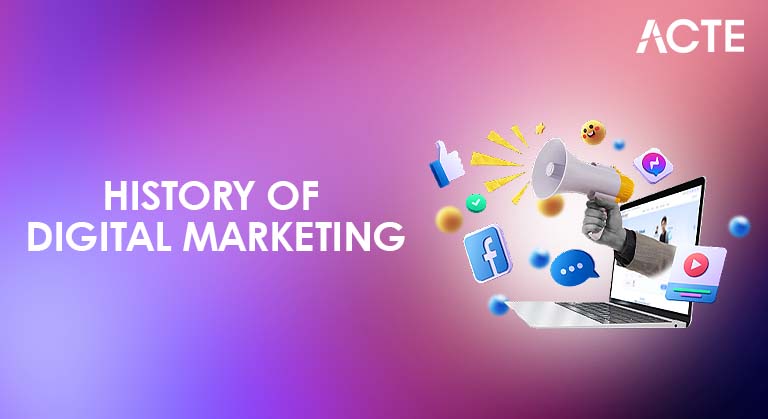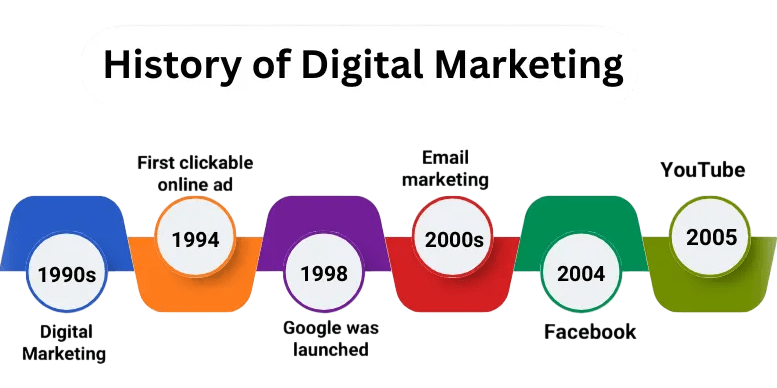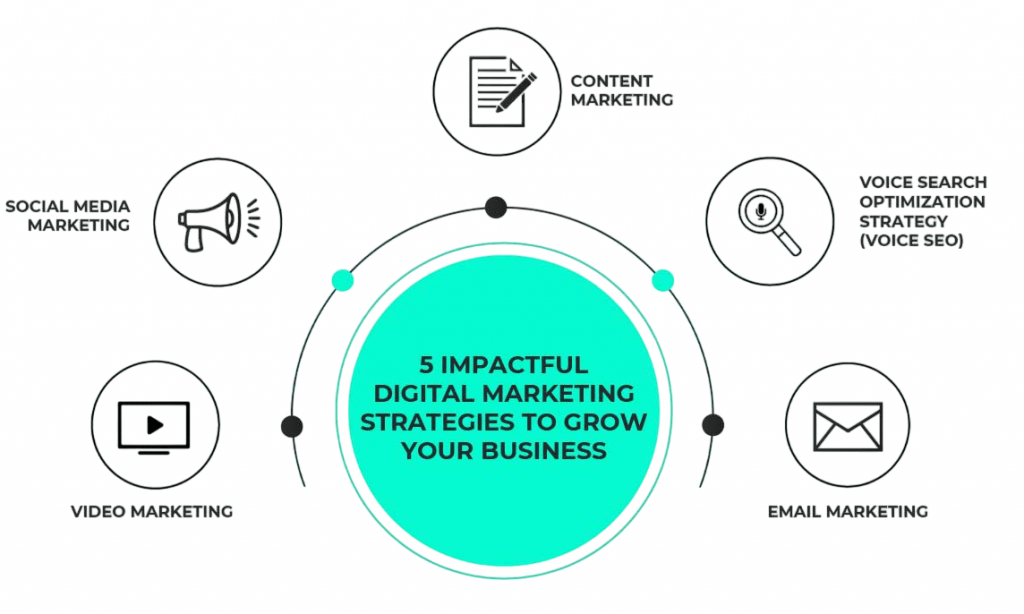
- Introduction: What is Digital Marketing?
- The Pre-Internet Era: Seeds of Digital Marketing
- The Birth of the Internet: Early 1990s
- The Dot-com Boom and Bust: Late 1990s to Early 2000s
- The Rise of Google and Search Marketing: Early 2000s
- Social Media Revolution: Mid to Late 2000s
- Mobile Marketing and the App Economy: 2010s
- The Era of Big Data, AI, and Programmatic Advertising
- How Digital Marketing Changed Business and Consumer Behavior
- The Future of Digital Marketing
- Conclusion
Introduction: What is Digital Marketing?
Digital marketing refers to the promotion of products or services using digital channels such as search engines, websites, social media, email, and mobile apps. Unlike traditional marketing, which depends on print, television, or radio ads, digital marketing leverages the internet and digital technologies to reach consumers more directly and interactively a paradigm shift explored in Digital Marketing Training, where learners gain hands-on experience with SEO, SEM, social media, and analytics tools to build dynamic campaigns that engage audiences in real time and drive measurable results across digital platforms. Understanding the history of digital marketing means understanding the growth of the internet, technological innovations, and shifting consumer behaviors that have shaped how brands communicate with their audiences.
Ready to Get Certified in Digital Marketing? Explore the Program Now Digital Marketing Online Training Offered By ACTE Right Now!
The Pre-Internet Era: Seeds of Digital Marketing
Digital marketing’s roots go back well before the internet came along. Foundational strategies formed through new communication technologies before the web. The 1980s were a turning point with the rise of cable television a historical evolution explored in Career Paths for Today’s SEO Specialist, where learners trace the transformation from broadcast media to search-driven ecosystems, mastering how legacy tactics evolved into modern SEO roles like content strategist, technical analyst, and digital brand architect.

This introduced targeted advertising channels that focused on specific audiences. At the same time, businesses used databases to run direct mail and telemarketing campaigns. This made customer engagement more personal. Even earlier, ARPANET was developed in the 1960s and 70s. It introduced key concepts in electronic communication that would later change marketing methods. These early efforts set the stage for the data-driven, personalized marketing strategies that grew with the internet’s spread. They show how technological innovation has changed the way businesses connect with their audiences.
The Birth of the Internet: Early 1990s
The true turning point in digital marketing history began with the commercialization of the internet in the early 1990s a pivotal shift highlighted in Examples of Successful Rebranding, where brands like Domino’s, LEGO, and Dunkin’ demonstrate how digital transformation, consumer feedback, and platform adaptation helped redefine their identity and reconnect with modern audiences in a rapidly evolving online landscape.
- 1991: The World Wide Web becomes publicly available: Created by Tim Berners-Lee in 1989, the World Wide Web opened access to a global network of information.
- First Website: The first website went live in 1991, marking the beginning of online content.
- Early Banner Ads (1994): HotWired, the digital version of Wired magazine, launched the first clickable banner ad in 1994, paving the way for online advertising.
- Search Engines: Early search engines like Yahoo! (1994) and AltaVista (1995) began to organize web content and help users find information.
At this stage, digital marketing was rudimentary, with static websites and banner ads being the main tools for brands to reach online audiences.
To Explore Digital Marketing in Depth, Check Out Our Comprehensive Digital Marketing Online Training To Gain Insights From Our Experts!
The Dot-com Boom and Bust: Late 1990s to Early 2000s
The late 1990s saw an explosion in internet usage and the birth of many digital companies, which led to rapid innovation in digital marketing.
- Rise of E-commerce: Amazon (founded in 1994) and eBay (1995) popularized online shopping, creating new opportunities for marketers.
- Email Marketing: By the late 90s, businesses were extensively using email campaigns to communicate with customers.
- SEO Emerges: As search engines grew, Search Engine Optimization (SEO) became essential for websites to rank higher and attract traffic.
- The Dot-com Bubble: Fueled by over-optimism, many internet companies received huge investments but eventually crashed around 2000, causing skepticism about online business models.
Despite the bust, this period firmly established the internet as a key platform for marketing.
The Rise of Google and Search Marketing: Early 2000s
Google’s launch in 1998 changed the digital landscape. It quickly became the leading search engine, transforming how people find information online. In 2000, Google introduced AdWords, a pay-per-click advertising model that let marketers bid on ads based on keywords a milestone covered in Learn Digital Marketing, where learners explore the evolution of paid search, keyword targeting, and bidding strategies that transformed how businesses reach audiences, measure ROI, and scale campaigns through data-driven advertising. Then in 2005, they released Google Analytics, which gave digital marketers powerful tools to track web traffic and assess campaign performance. As search engine optimization grew, marketing strategies shifted from basic keyword stuffing to more refined methods focused on link-building, content quality, and improving user experience. This important period marked a big change from traditional broad display advertising to targeted search marketing. Understanding what consumers want became essential for effective digital communication strategies.
Looking to Digital Marketing Training? Discover the Digital Marketing Expert Masters Program Training Course Available at ACTE Now!
Social Media Revolution: Mid to Late 2000s
The rise of social media platforms like Facebook, YouTube, and Twitter from 2004 to 2006 changed digital marketing. They offered new chances for two-way communication and building communities. These platforms allowed brands to connect with their audiences in a more personal and viral way, transforming traditional advertising methods a shift explored in Digital Marketing Training, where learners master the art of social media engagement, viral campaign design, and audience-centric storytelling to build brand intimacy, amplify reach, and redefine advertising through participatory digital experiences. Facebook’s targeted advertising options made it possible to reach specific demographics and behaviors. This, along with the growth of content marketing and partnerships with influencers, created an active environment where businesses could engage users with valuable and genuine content. By allowing brands to interact directly with consumers and work with social media figures, these platforms extended marketing reach and created deeper, more engaging connections that went beyond traditional one-way communication.
Mobile Marketing and the App Economy: 2010s
The widespread adoption of smartphones changed digital marketing dynamics once again.
- Mobile Optimization: Websites had to be responsive to fit mobile screens, changing SEO strategies.
- App-Based Marketing: Brands developed mobile apps to engage users and provide personalized experiences.
- Location-Based Marketing: GPS technology enabled marketers to target consumers based on their physical location.
- SMS and Push Notifications: Direct mobile communication channels became important tools for promotions.
Mobile marketing meant marketers had to adapt to a multi-device world and reach consumers on-the-go.
Preparing for Digital Marketing Job Interviews? Have a Look at Our Blog on Digital Marketing Interview Questions and Answers To Ace Your Interview!
The Era of Big Data, AI, and Programmatic Advertising: Late 2010s to Present
Advances in data science and machine learning ushered in a new age of precision marketing.
- Big Data: The explosion of consumer data from websites, social media, and devices gave marketers insights to segment audiences deeply.
- Artificial Intelligence: AI powers chatbots, personalized recommendations, and predictive analytics.
- Programmatic Advertising: Automated ad buying platforms allow real-time bidding and hyper-targeted campaigns—capabilities reshaped by AI as explored in Digital Transformation, where machine learning algorithms optimize bid strategies, predict user behavior, and personalize ad delivery to maximize ROAS and connect brands with the right audiences at the perfect moment.
- Omnichannel Marketing: Integration across channels (online and offline) became crucial to providing seamless customer experiences.
- Privacy and Regulation: GDPR (2018) and other regulations changed how marketers collect and use data, emphasizing transparency and consent.
This era emphasizes efficiency, personalization, and respecting consumer privacy in digital marketing.
How Digital Marketing Changed Business and Consumer Behavior
Digital marketing has changed how brands interact with consumers by transforming traditional communication models. Unlike previous advertising methods, digital channels now allow for immediate two-way conversations. Brands can get instant feedback and engage more actively with their audiences. This change relies on data-driven strategies that support real-time campaign tracking and optimization. Marketers can make precise, informed decisions as a result. Additionally, digital platforms have made marketing more accessible.

They allow for personalized messaging based on individual consumer behaviors and preferences. Even small businesses can reach a global audience like never before. This leads to a more transparent marketplace where consumers feel empowered. They can easily research, compare, and review products across various online platforms. This shift hasn’t just changed marketing strategies; it has also transformed the relationship between brands and customers. We now see a more interactive, responsive, and customer-focused environment.
The Future of Digital Marketing
Looking forward, digital marketing will continue evolving with emerging technologies:
- Metaverse and Virtual Reality: Brands will explore immersive experiences for marketing.
- Voice Search Optimization: As smart speakers grow, voice search will change SEO.
- AI and Automation: More sophisticated AI will enable hyper-personalized, scalable marketing.
- Sustainability Marketing: Ethical and eco-conscious marketing will become increasingly important.
- Increased Privacy Focus: Marketers will innovate ways to personalize without violating privacy.
Conclusion
The journey of digital marketing has been all about change, creativity, and growth. It began with the first banner ads in the 1990s. Since then, we have witnessed significant changes leading to today’s marketing strategies that use artificial intelligence and work across multiple channels. This shift has transformed how businesses connect and build relationships with their customers a paradigm explored in Digital Marketing Training, where learners discover how digital channels enable real-time engagement, personalized messaging, and data-driven relationship building that fosters loyalty, trust, and long-term growth in today’s competitive landscape. As technology keeps progressing and consumer expectations continue to rise, it’s clear that digital marketing will keep changing too. This ongoing transformation will shape the future of commerce and communication in ways we are just starting to comprehend. For marketers, entrepreneurs, and anyone interested in the field, understanding the history of digital marketing is essential. It offers valuable insight into the tools developed over the years. Knowing how we arrived at this point reveals the exciting opportunities ahead. Whether you are searching for new ways to engage an audience or looking to expand the limits of what is possible, understanding the past will help you navigate the ever-changing marketing landscape with confidence. By embracing this knowledge, you can take advantage of advancements in digital marketing and seize emerging opportunities.




